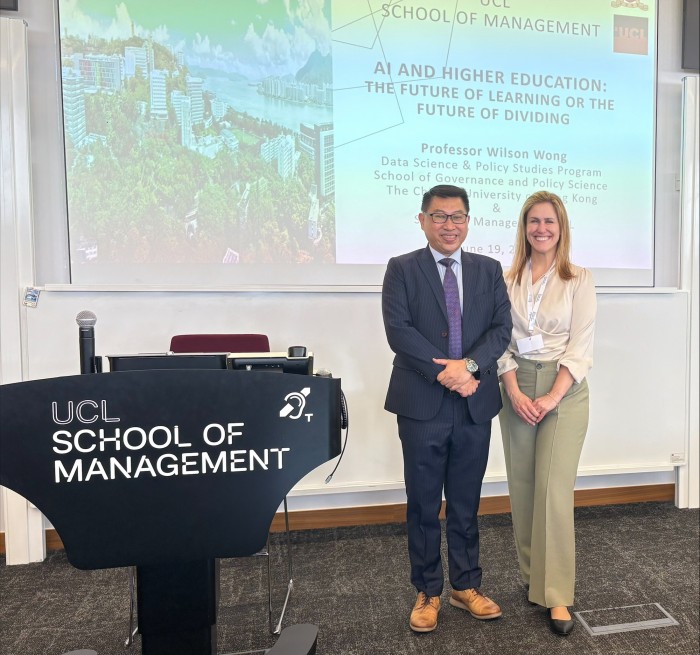
On Tuesday 17 June, UCL School of Management hosted a thought-provoking guest lecture with Professor Wilson Wong, an Associate Professor at The Chinese University of Hong Kong, to discuss ‘The Future of Learning or the Future of Dividing? Exploring the Impact of General Artificial Intelligence on Higher Education.’ The lecture drew upon a joint research project with Professor Angela Aristidou, exploring the ways in which the rise of generative artificial intelligence (GAI) will reshape the future of higher education. Their paper has already been accepted by the Data & Policy journal, underlining the significance of the topic.
Hosted on Level 50 in the North West Lecture Theatre, Wilson began his talk by expressing how Generative Artificial Intelligence programmes such as DeepAI, ChatGPT, and Gemini continuously reshaped the core of how knowledge is produced, distributed, and consumed in Higher Education. The unknown possibilities of AI dependency leaves the question of whether AI will be a driver for community segregation where underserved communities will remain in the past, or if it will become an asset through democratisation and reducing inequality.
To explore the hypothesis, Wilson expressed the need to investigate the transformative potential of Generative AI in Higher Education, develop a Theoretical Framework, empirically assess GAI integration, and evaluate the equity implications. Wilson stated there is evident practice of ‘Creative Destruction’ by AI. Creative Destruction is an economic concept that describes the process in which innovations replace and render older technologies or practices obsolete. He adds, ‘AI is driving economic change by dismantling established industries while simultaneously creating opportunities for new enterprises.’
Diving into the theoretical framework, Wilson explored the possibility of AI aiding in job transformation, where people will now focus on more complex problem-solving, decision-making, and empathy-driven roles. Additionally, there is an emergence of new roles such as AI prompt engineers, algorithmic auditions, AI ethicists, and digital learning designers which all require a hybrid skillset, with both technical knowledge and human insight. By segregating the framework into four core capacities - AI Ethics, AI Literacy, Human-AI Collaboration, and Human-Distinctive Capacities - Wilson expressed the opportunity to understand the impact of AI on its users. For example, Human-AI Collaboration is where the use of AI aids with brainstorming research questions, whereas AI Ethics encourages ethical reasoning within cultural and societal contexts.
Professor Wong then challenged the audience to reflect on the growing inequality of AI access and literacy, as well asthe role of universities and policymakers in ensuring equitable access to AI technologies—so that all students, regardless of background, can participate meaningfully in this evolving landscape. In short, preparing future managers and policymakers to understand, navigate, and shape AI’s role in society is more critical than ever. AI is no longer just a topic for computer scientists—its impact is already widespread and profoundly transformative.
Concluding the event, Wilson exclaimed ‘The question is not whether AI will change education - but how. Will we allow it to be a force for inclusion or division?’